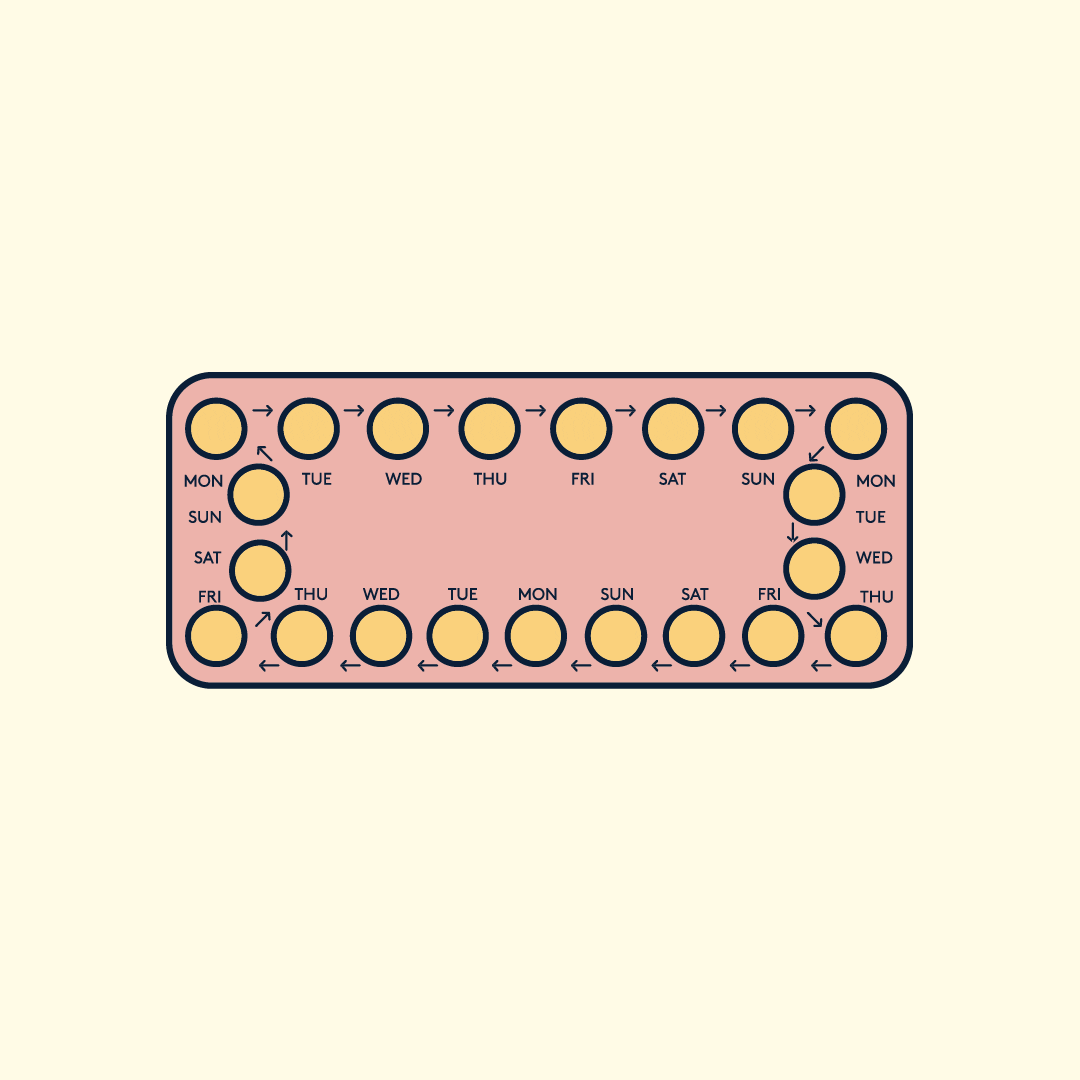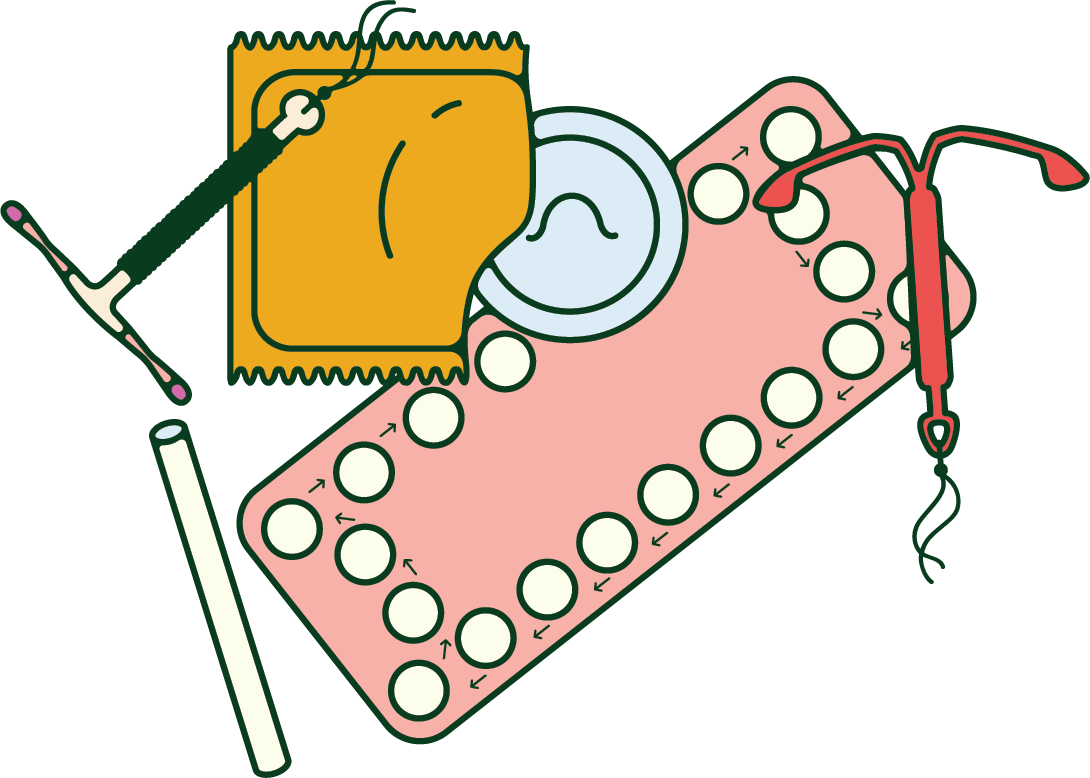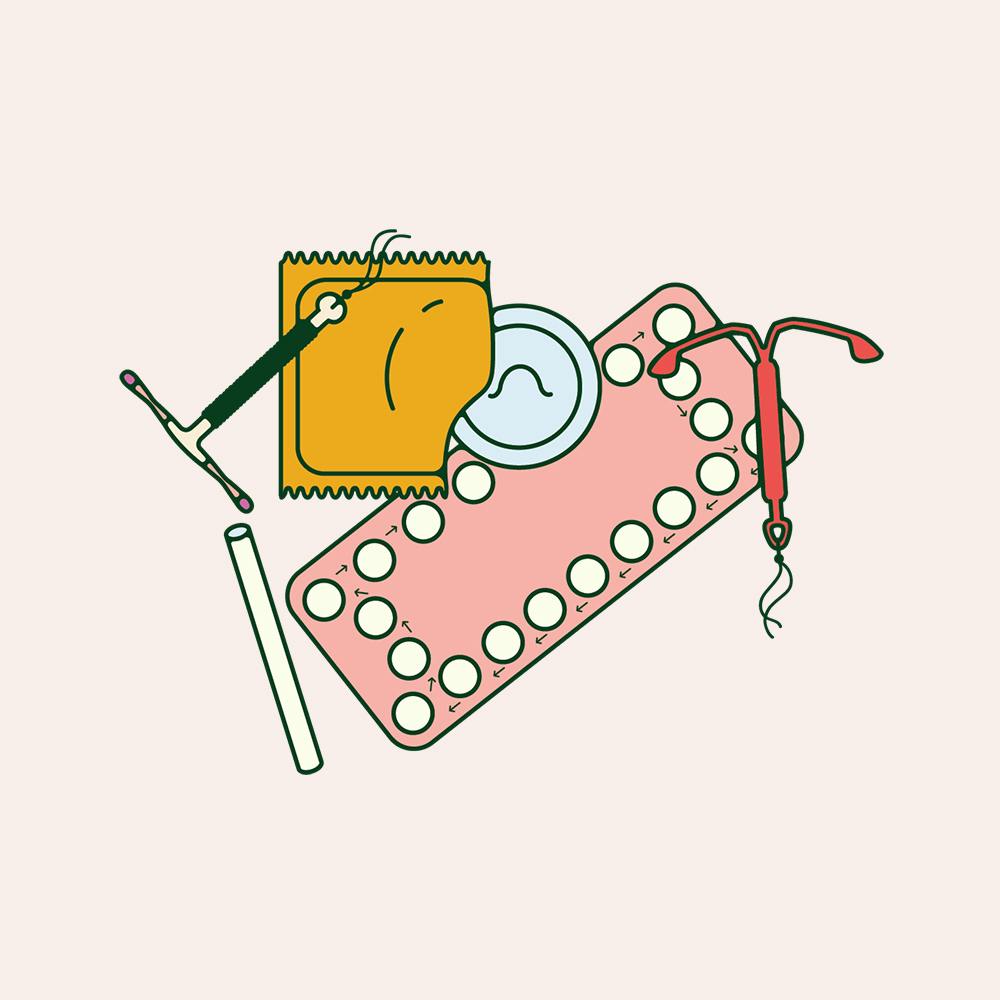Illustrated by Erin Rommel & Sabrina Bezerra
There are 15 types of contraception available, and women try an average of between three and four (including different types of pill) before settling on one that fits their body and lifestyle.
Finding a form of contraception that doesn’t cause the all-too-regular side effects like headaches, irregular bleeding, nausea, pain, low libido, acne and mood swings can be a struggle.
Most women start on the combined pill, which contains the hormones oestrogen and progesterone, or the progestogen-only mini pill.
GPs are most familiar with this method, are likely to prescribe it for first-time patients, and it’s the most “popular” form of contraception in the UK.
But whether you pop a pill, have monthly injections, get an implant under your skin, change a patch every day, carry condoms around or have an IUD or IUS fitted inside you, the daily commitment to contraception is predominantly left to women.
Jen Eastwood started her contraception journey at age 15. Her friends were being prescribed the pill and – after a visit to her doctor where she was given “minimal advice” with nothing about side effects or other options – she started taking the combined pill Yasmin.
As time went on, Jen found that her periods became more painful and her PMS symptoms got worse. “Each time I went back [to the doctors] I was prescribed something different – 'try it and see how you get along’ – like it was a different choice of milkshake, not medication.” She remembers trying pills Cilest and Microgynon. While taking the latter, she suffered severe mood swings.

Hormones can play a major role in mood changes, and hormonal contraceptives are often anecdotally linked to depression. 1 in 20 women will suffer from a severe form of PMS called premenstrual dysphoric disorder (PMDD), causing severe versions of regular side effects.
In some cases it can lead to suicidal thoughts. It’s been shown that cells from women with PMDD respond differently to hormones, and those in oral contraceptives are generally thought to help. A 3-month trial is often suggested, but in some cases can make things worse.
At age 26, Jen’s PMS developed into PMDD with “near-suicidal depression dips” in the week leading up to day 1 of her cycle. Her GP wasn’t sympathetic. It was “dismissed as just PMS and normal”, with the doctor telling her that side effects “can take a while to settle.”
“
Each time I went back I was prescribed something different—‘try it and see how you get along’—like it was a different choice of milkshake, not medication.
Studies show that ineffective communication between doctors and female patients is “often the norm” when it comes to birth control, and that medical professionals need to ask more specific questions, such as “how are you finding taking the pill every day?”
It can take time for your body to adjust to any new medication – a valid reason for them to suggest bearing with side effects for a few months – but this adds to the fact that a lot of women don’t feel listened to by their healthcare professionals.
A short appointment (usually taken up by BMI and blood pressure checks) doesn’t really prepare a person for potential side effects, or give a full lowdown of what’s available.
Only 2% of GPs offered the full range of contraceptives to patients in 2016, with a fifth saying they didn’t offer the IUD or IUS and a quarter saying they didn’t offer the implant. More than half of GPs agree there’s just “not the time” in a standard appointment to talk through contraception options.
The pill and implant brought on mood swings, aggressive acne and bouts of depression for Jenny Rae, 28, who was convinced they were a "necessary evil."
She had the implant taken out after less than a year, and decided to get the copper IUD fitted after hearing about her friends’ experiences – plus a decision to "not put any more hormones into my body.”
“When I told [the sexual health nurse] my reasons for not wanting the Mirena IUS (a hormonal coil that is replaced every five years), she told me that there was no scientific correlation between mental health and hormonal contraception.
At age 26, I felt that I knew my own body and what worked and what didn't – I had also heard countless stories of other women who had had a negative impact on their mental health from hormonal contraception. The nurse agreed to disagree.”
Last year, a study found that women taking the pill had a smaller hypothalamus – the part of the brain that produces hormones and helps regulate essential bodily functions including temperature, mood, appetite, sex drive, sleep cycles and heart rate – in comparison to those that didn’t. Clearly, a lot more research needs to be done into all symptoms and side effects.
“
I felt that I knew my own body and what worked and what didn't
Following bouts of nausea and “crazy back pain” for nearly 2 years while taking oral contraceptives (plus a short trial of the NuvaRing), Isabel Passos, 34, decided to go completely back to basics and started using non-latex condoms (she’s allergic to regular ones).
“A while afterwards my doctor told me to try the Mirena IUS and I had that for 10 years. I felt pain to get it in – but nothing afterwards, no periods pretty much and no side effects.”
It’s fairly regular for women to move from the pill to long-acting reversible contraceptives (LARC), such as coils, injections and implants.
In a US study of 1,840 new oral contraceptive users, only 41% of pill users were “very satisfied” with their method after a year of use, and 45% of women using oral contraceptives stopped using it during that year.
Between 2007 and 2017, the amount of British women on LARC methods doubled to 39%, put down to further education of doctors from 2010, which meant they were more confident to pass on recommendations of these forms of contraception.

If doctors don’t feel confident in prescribing certain types of contraception, where can you get the information to make an informed decision? There’s the NHS website of course, and contraception issues have always been shared within friendship groups.
Now, there are also online resources like The Lowdown, a platform where women can share their experiences and reviews of contraception. There’s also UCL’s Contraceptive Choices, with a wider range of information on each type and a survey to help you find your top 3 methods. All useful details to take with you to the doctor or clinic, that will hopefully help you find ‘the one’ quicker.
For all of us, trying to balance the physical and mental side effects of these medications with everyday pressures can feel a bit like playing Russian roulette: how will the end of puberty, school, college, university, work, parenthood, perimenopause be affected by all this trial and error?
It’s time that individual, more holistic conversations about a person’s unique lifestyle, mental health and restrictions are had before a specific path is recommended.
Each of us is different, and needs different guidance. Jenny states, “I think everyone should be given all the information and be free to make their own choices, not told what to take.”






